
February 7, 2012 — The revolutions during the Arab Spring have yielded disappointing results for women, said NPR foreign correspondent Lourdes Garcia‑Navarro at a Shorenstein Center event. While the events of Tahrir Square and across the Middle East provided women with unprecedented opportunities, she said, when the smoke cleared, women once again found themselves underrepresented in government.
“The regional changes in the Middle East have provided women with distinct opportunities and immense challenges,” Garcia-Navarro began. “The revolutions across the Arab world have allowed women, in a vital way, to be part of the story,” she continued. While many of the women who participated in the uprisings were part of the “empowered, educated elite,” Garcia-Navarro noted, “women from all classes for the first time felt they had a voice and a role to play in the unfolding drama.”
Then came the elections in Egypt: “Only 2 percent of the new Egyptian Parliament will be comprised of women. Two percent,” Garcia-Navarro exclaimed. “That’s shockingly low by anyone’s standards.” The reason for the low representation, she explained, was that the electoral commissions in Egypt and also Libya did not require a minimum number of offices held by women, and so not only were women low on the candidate lists, but women who ran independently did not receive votes.
Garcia-Navarro shared her interview with Dalia Hamid, a female activist in Egypt who ran for Parliament and has researched the gulf between men and women in public office. She has been fighting back against the idea that democracy must come first, and civil rights later: “If we want real democracy that comes with civil rights…we should involve women first and foremost,” Hamid said. She described women’s place in Egypt before and after the revolution as “second-class citizens” and “marginalized.”
Speaking from her own experience as a female correspondent in the Middle East, Garcia-Navarro said that sexual harassment had been an “open secret” among her female colleagues until the attack on Lara Logan brought the issue to the forefront. Women had generally been hesitant to report harassment, Garcia-Navarro said, because they knew the “knee-jerk reaction” of news organizations would be to keep women from reporting in those areas. She remarked how that would be a disservice to good journalism, as female reporters are often able to bring a different perspective, and are “invited to the back rooms where women sit..and have access to the often silent 50 percent.”
By Janell Sims, Shorenstein Center.
Photos by Heather McKinnon, Shorenstein Center.

